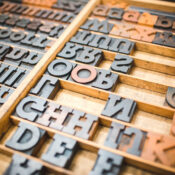Senior managing editor and logophile Andy Hollandbeck reveals the sometimes surprising roots of common English words and phrases. Remember: Etymology tells us where a word comes from, but not what it means today.
From counting sheep to figuring the 1,000th decimal place of pi, math has been a daily tool for mankind’s needs — large and small. Today, we we’ve got handheld digital computers that can perform the most complex calculations with ease, but of course that’s just the near end of centuries of technological and mathematical progress.
And along with that mathematical development is the evolution of the language to describe it. Today’s travel through word history begins in the gardens of ancient Rome.
In Latin, the verb putare originally meant “to prune,” what ancient gardeners would do to produce the best fruits and vegetables. But it developed a second sense of “to reckon” or “to consider.” Com- is a Latin prefix that means “with, together,” so “to reckon with” or “to reckon together” — that is, “to sum up” — was expressed in the word computare.
In Old French, that verb became conter (say computare quickly and you’re almost there), meaning “to add up.” This word crossed the English Channel and evolved, by the late 14th century, into count, both in the “enumerating individual items” and the “repeating the numerals in order” senses.
But the Latinate world wasn’t done with computare. This was, after all, the Renaissance, a time that saw great strides in mathematics and science. New words were needed for concepts and calculations of all sorts.
Computare also became the French verb computer (the last syllable is pronounced “ay”), which, by the early 1600s, had become the English compute “to determine by calculation.” By the 1640s, we find in English texts mention of the first computers. Of course, at the time the word referred to people, not machines, performing mathematical calculations.
Count and compute are essentially the same word adopted into English twice about two centuries apart. This phenomenon of a word being adopted multiple times in multiple forms years apart is not unique — it’s also happened with hotel and hostel, chief and chef, frail and fragile, and other word pairs, too. The different forms the words take are a reflection not only of the state of the two languages involved at the time but also their relative prestige among the literate class.
Bonus history: The “pruning” sense of the Latin putare didn’t disappear in the mists of time. If you were cutting down a nice, straight tree with the intention of, say, building a log cabin, one of the first things you would do is prune off all the branches around the main trunk. The Latin prefix meaning “around” is ambi-, sometimes shortened to just am-. The verb for cutting off the limbs around a trunk was amputare. By the time the word found its way into English by the beginning of the 1600s, amputation referred to the removal of limbs from trees, but it wouldn’t be long before it referred to severing limbs from people, too.
Become a Saturday Evening Post member and enjoy unlimited access. Subscribe now




Comments
I love this week’s feature on the origin of ‘computer’. Naturally we have the always wonderful and reliable Latin and French connections to thank once again. The fact the word existed in the 1640’s is amusing to think about. The fact it meant people (not machines) doing the calculations doesn’t take anything away from the word’s existence then otherwise.
The computing was something that just didn’t have a machine to do the work… yet. That would take another 300 years, accelerating into smaller and smaller devices we have now that don’t do much ‘computing’ these days unless you tap the calculator app on the phone.
About 50 years ago, some people were afraid of being replaced by computers like they are of AI today. The latter seems a lot more likely, but the former was dealt with in a funny episode of ‘Here’s Lucy’ in 1972 called ‘The Replacement’. Uncle Harry attempts to do just that and it backfires, of course. My favorite scene is where she’s in the kitchen defending people’s intelligence when she raises the electric beaters out of the bowl while still on, and the contents flies all over her shocked daughter Kim (Lucie).